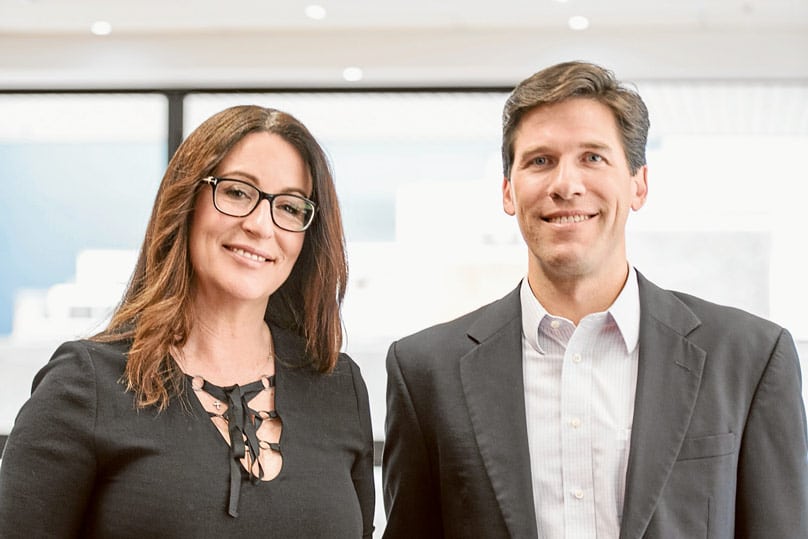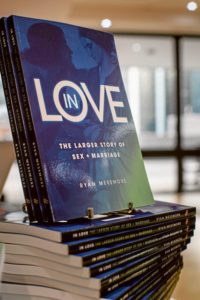
When Dr Ryan Messmore and his future wife, Karin, were dating at university, they longed for a deeper, more meaningful story about love and marriage, than what they were hearing from the hook-up culture around them.
They wanted something better than the cultural narrative of sex as merely physical pleasure and marriages that last only as long as fickle human feelings.
Clearly they were not alone, given the number of TV shows on the topic of relationships—from Married At First Sight, where people marry complete strangers, to The Last Resort, where couples air their dirty laundry on TV as a last ditch effort to save their relationships. It seems everyone is trying to figure out what romantic relationships ought to be and how to improve them.
The good news is—as Ryan and Karin discovered—there is an understanding of love, sex and marriage which is hope-filled, joyful, deeply meaningful and liberating in stark contrast to what secular culture has to say. Where does this refreshing view come from? It’s the Christian story of marriage as derived from the Bible.
Ryan, a former President of Campion College in Sydney and now founder and Executive Director of the Millis Institute in Brisbane, launched In Love: The Larger Story of Sex and Marriage—published by Connor Court Publishing. The book, launched at the Archdiocese of Sydney’s Polding Centre on 27 April, is an interweaving of three love stories: the ancient Jewish betrothal story, the larger biblical story of God’s love for his people, and Ryan and Karin’s own love story.

“This book is a narrative and I’d love for people to hear a positive story of what marriage can be today in a modern, secular culture and to feel attracted to that positive vision, to hear a winsome account of something deeper,” Ryan said.
“I think young people today want something beyond themselves and I thought that this book might fill a space in today’s conversation about love, sex and marriage.”
Ryan chose the powerful medium of story to convey this positive view of marriage because of C S Lewis who wrote about, “stealing past the watchful dragons and going through the imagination,” to convey truth to one’s audience.
Indeed, Ryan and Karin owe much to Lewis—they got to know each other through studying a unit on his Narnia books while at Duke University.
During their early dating relationship, they became intrigued by the ancient Jewish betrothal story, which placed love, marriage and sex in the context of covenant faithfulness, not romantic feelings.
“I became aware of the fact that in 1 Corinthians 13, St Paul uses 15 different words to describe love. In the original Greek every single one of those 15 words is a verb,” Ryan says. “So I thought ok, if I were to try to think about love as a verb, what sort of framework would make sense of that? The Jewish betrothal story makes sense of that in spades.”
Ryan and Karin decided to incorporate some aspects of that Jewish betrothal story into their own relationship. Engagement, for example, was a much bigger deal for them than it would have been otherwise.
In the Jewish tradition, a man and woman would enter a covenant relationship with each other from the moment of their betrothal. This meant that they drew up a covenant document, stipulating the terms of the covenant, an agreement that was legally binding. That is why in the Gospels we are told that Joseph decided to divorce Mary, his betrothed, when he found she was with child. Despite the fact they were not yet married, their covenant relationship began with betrothal.
For Ryan and Karin, who were Protestants at the time, taking this serious step meant rather than pre-marriage counselling, they sought “pre-engagement counselling”, much to the surprise of their pastor.
But what exactly is a covenant, as opposed to merely a contract or promise? According to Ryan, “A covenant is a family-expanding, identity-joining, relationship under God.”
In the Old Testament, God forms this covenant bond with his people through the great patriarchs—Adam, Noah, Abraham, Moses and David.
“A covenant says who you are in your deepest identity will now be shared and it will be received by the other—your covenant partner. So it’s an exchange of identity, permanently, forevermore,” Ryan says. “It’s a fruitful kind of relationship. It extends kinship bonds.”
The whole marriage ritual in the Jewish tradition is therefore about forming a covenant between a man and a woman, as a reflection of God’s covenant with his people.
Not all aspects of the Jewish betrothal story were suitable for application to their own modern-day relationship, however it was the overall covenantal nature of the Jewish approach to marriage which appealed to Ryan and Karin—an approach which allows feelings to be channelled in a way that encourages faithfulness, commitment and patience. Ryan talks of romantic desire as “a prompting toward personal communion.”
He says, “Sexual attraction is the bodily expression of a deeper design, and romance is good if it remains connected to the purpose of that design: the full, covenantal union of a man and woman we call marriage.”
It was through incorporating aspects of this Jewish betrothal story into their own relationship that Ryan and Karin began to see how their own impending marriage would participate in a much larger love story—the love story between God and his people as told in the Bible.
“It struck us as such a beautiful adventure to be invited into, the larger more ancient story bigger than ourselves—God’s story. This Jewish betrothal process was the way into that story in terms of our marriage.”
According to Ryan, the covenantal approach to marriage helps us to see sex not just as achieving unity and procreation, but also as renewing the covenant between the couple, thereby imaging the covenant between God and creation.
“The new covenant that God has entered into with the Church is renewed at every Mass, every Eucharist. Sex has the power to do that in marriage but we just don’t think about it in those terms.”
Ryan and Karin now have three children and the whole family were received into the Catholic Church together in 2008.
He says that on the surface of it, especially when seen through the lens of our current cultural narrative, the covenantal view of marriage may seem burdensome and restrictive. Yet he says there is actually nothing more liberating.
“Everything in our culture is telling us, ‘Don’t tie yourself down. Don’t limit yourself to only one person’. But think about the brokenness, the heartache that sort of freedom leads to. The Christian story is a story where there is fulfilment and permanence … There is all sorts of room within that for pleasure, for intimacy, for personal growth, all the good things—freedom.
“Knowing you’re within the bounds of a permanent relationship frees you up to be honest, to be open because you don’t have to fear your partner getting frustrated or running away. So it’s the most liberating thing there is to commit yourself to one covenant partner. It’s the sort of upside-down logic of the Gospel.”
And the title of the book? Well, Ryan says it has a double meaning. He and Karin intentionally gave up using terms like “fall in love” and “love at first sight” that use love as a noun. They wanted to think of it as a verb, something one does, not something one feels.
Ryan came across another C S Lewis quote in The Great Divorce. When a particular character in the book arrives in heaven and is united with God, she says, “I have finally found myself in love. I am in love Himself.”
And this is the message that Ryan hopes his book will convey—that the earthly union of man and woman in marriage points to our ultimate union with God, who is love Himself, at the wedding feast of the Lamb.
In Love: the larger story of Sex and Marriage is available from the Mustard Seed Bookshop for $29.95 + postage and handling. Contact the Mustard Seed on (02) 9646 9000 or via www.mustardseed.org.au
